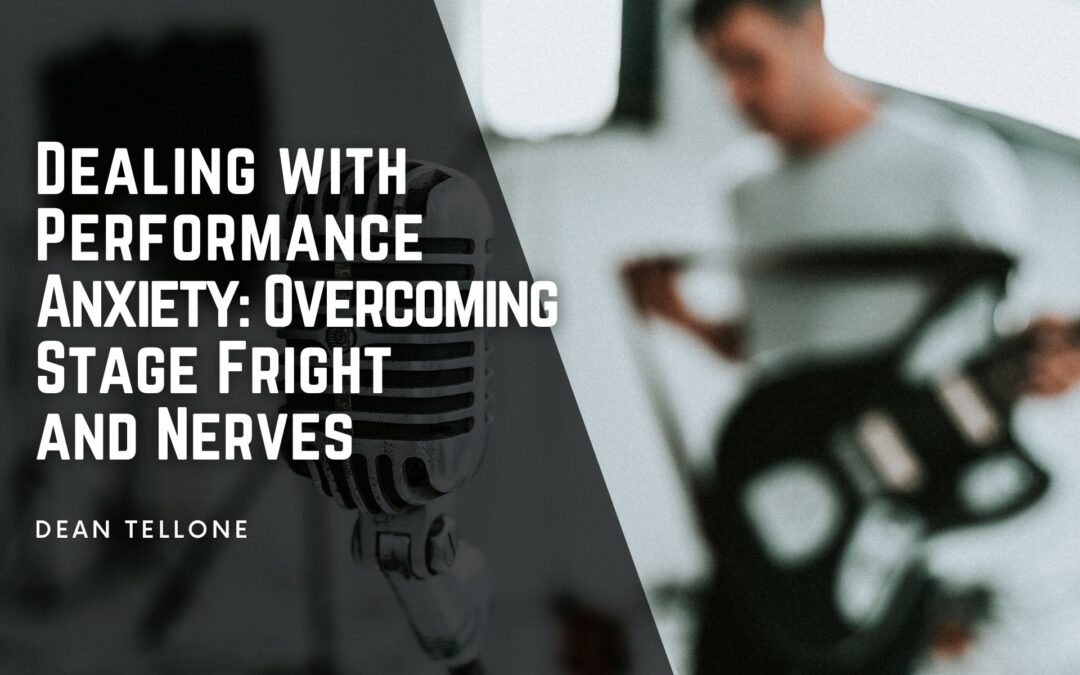For anyone who has been faced with performing on stage or in front of a crowd, the grip of stage fright can feel overwhelming. Whether you’re a musician, a speaker, or an athlete, that anxious pit in your stomach can be a formidable hurdle. The good news is that overcoming stage fright is not an insurmountable challenge. In this guide, we’ll explore practical exercises to help you conquer performance anxiety, both in the short term for your next performance and with a focus on long-term solutions addressing the root causes of your anxiety.
Key Strategies for Overcoming Stage Fright
1. Minimize Stress Responses:
Overcoming stage fright involves techniques that reduce stress responses, allowing performers to stay calm and deliver their best. The fear and worry associated with performances trigger the release of stress hormones like adrenaline, leading to symptoms such as shaking, sweating, and nausea.
2. Short-Term vs. Long-Term Solutions:
Distinguishing between curing performance anxiety and overcoming stage fright symptoms is crucial. Short-term solutions focus on minimizing stress responses before a performance, while a longer-term approach involves identifying and addressing the root causes of anxiety.
3. Techniques to Control Stress Response:
Techniques include consuming brain-boosting nutrients like GABA and L-theanine, conducting dress rehearsals in the actual performance setting, practicing deep belly breathing to deactivate the sympathetic nervous system, engaging in rigorous exercise to improve mood and confidence, and shifting focus away from oneself to reduce nervousness.
4. Consume Brain-Boosting Nutrients:
GABA and L-theanine, found in green or black tea, help promote calmness and mental focus. Supplements like PerformZen, combining GABA, L-theanine, magnesium, vitamin B6, Ginkgo Biloba, and theacrine, work synergistically to enhance calmness and confidence.
5. Dress Rehearsals:
Practice in the venue where the performance will take place, wearing the intended outfit. Familiarity and comfort with the setting increase the chances of remaining calm during the actual performance.
6. Deep Belly Breathing:
A simple yet powerful technique, deep belly breathing deactivates the sympathetic nervous system, helping performers return to a more regular state. Focus on the breath, body sensations, and maintaining mindfulness for about 15 minutes before the performance.
7. Rigorous Exercise:
Incorporate 15-20 minutes of intense exercise before a performance to leverage the calming effects and boost confidence. Regular exercise improves heart rate variability, teaching the body to remain calm under pressure.
8. Shift Focus Away from Yourself:
Adopt a mindset shift, similar to how George Clooney overcame audition anxiety. Instead of dwelling on personal insecurities, focus on how your performance can benefit others – solving problems for the audience, being a reliable teammate, or addressing the needs of the moment.
Addressing Social Anxiety:
To achieve a lasting solution, especially for severe performance anxiety, addressing underlying social anxiety is essential. Cognitive-behavioral therapy (CBT) is an effective long-term approach, breaking down anxiety-inducing situations into manageable parts and replacing negative thought patterns with positive ones.
Overcoming performance anxiety is achievable with a combination of short-term techniques and long-term solutions. Experiment with these strategies to find what works best for you, and for a permanent cure, consider seeking guidance from a licensed therapist to address underlying social anxiety.
Remember, conquering stage fright is a journey, and with the right tools and mindset, you can elevate your performances to new heights.

